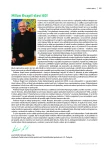-
Medical journals
- Career
Prevention and therapy of sarcopenia in the ageing
Authors: Zdeněk Zadák
Authors‘ workplace: Centrum pro výzkum a vývoj III. interní gerontometabolické kliniky LF UK FN Hradec Králové
Published in: Vnitř Lék 2016; 62(7-8): 671-677
Category: Reviews
Overview
Sarcopenia is one of the severe disorders associated with nutritional imbalance. While sarcopenia is an inseparable part of the process of ageing as people get older, it plays a vital role in pathological situations such as protein-calorie and kwashiorkor malnutrition, it accompanies various diseases of rheumatic character and is an almost ever-present feature of the clinical picture of oncological patients. Sarcopenia in people under strain is fatally manifested mainly in the elderly, medically fragile patients. In view of the fact that sarcopenia is the decisive factor regarding the course of chronic as well as acute illnesses, it must be diagnosed, monitored and appropriately treated in time. Although nutrition is not the only factor involved especially in older age in the development of sarcopenia, the type of nutritional support and, in the new era, particularly nutritional pharmacology, form the underlying principles of the approach to the comprehensive care of the patient.
Key words:
ageing – lipids – malnutrition – proteosynthesis – sarcopenia
Sources
1. Zadák Z. Výživa v intenzivní péči. 2.ed. Grada: Praha 2008. ISBN 978–80–247–2844–5.
2. Zadák Z, Havel E et al. Intenzivní medicína na principech vnitřního lékařství. Grada: Praha 2007. ISBN 978–80–247–2099–9.
3. Bahat G, Ilhan B. Sarcopenia and the cardiometabolic syndrome: A narrative review. Eur Geriatr Med 2016; 7(3): 220–223.
4. Thomas DR. Loss of skeletal muscle mass in aging: Examining the relationship of starvation, sarcopenia and cachexia. Clin Nutr 2007; 26(4): 389–399.
5. Batsis JA, Mackenzie TA, Jones JD et al. Sarcopenia, sarcopenic obesity and inflammation: Results from the 1999–2004 National Health and Nutrition Examination Survey. Clin Nutr 2016; pii: S0261–5614(16)30020–6. Dostupné z DOI: <http://dx.doi.org/10.1016/j.clnu.2016.03.028>.
6. Acharyya S, Butchbach MER, Sahenk Z et al. Dystrophin glycoprotein complex dysfunction: A regulatory link between muscular dystrophy and cancer cachexia. Cancer Cell 2005; 8(5): 421–432.
7. Arik G, Ulger Z. Vitamin D in sarcopenia: Understanding its role in pathogenesis, prevention and treatment. Eur Geriatr Med 2016; 7(3): 207–213.
8. Zadák Z, Květina J. Metodologie předklinického a klinického výzkumu v metabolismu, výživě, imunologii a farmakologii. Galén: Praha 2011. ISBN 978–80–7262–748–6.
9. Kalinkovich A, Livshits G. Sarcopenia – The search for emerging biomarkers. Ageing Res Rev 2015; 22 : 58–71.
10. Chen JL, Walton KL, Winbanks CE et al. Elevated expression of activins promotes muscle wasting and cachexia. FASEB J 2014; 28(4): 1711–1723.
11. Boström PA, Fernández-Real JM, Mantzoros C. Irisin in humans: recent advances and questions for future research. Metabolism 2014; 63(2): 178–180.
12. Sergi G, Trevisan C, Veronese N et al. Imaging of sarcopenia. Eur J Radiol 2016; 85(8): 1519–1524.
13. Lardiés-Sánchez B, Sanz-Paris A, Boj-Carceller D et al. Systematic review: Prevalence of sarcopenia in ageing people using bioelectrical impedance analysis to assess muscle mass. Eur Geriatr Med 2016; 7(3): 256–261.
14. Kim JS, Wilson JM, Lee SR. Dietary implications on mechanisms of sarcopenia: roles of protein, amino acids and antioxidants. J Nutr Biochem 2010; 21(1): 1–13.
15. Song YH, Song JL, Delafontaine P et al. The therapeutic potential of IGF-I in skeletal muscle repair. Trends Endocrinol Metab 2013; 24(6): 310–319.
16. Nissen SL, Abumrad NN. Nutritional role of the leucine metabolite β-hydroxy β-methylbutyrate (HMB). J Nutr Biochem 1997; 8(6): 300–311.
Labels
Diabetology Endocrinology Internal medicine
Article was published inInternal Medicine

2016 Issue 7-8-
All articles in this issue
- Estimating the prevalence of potential drug interactions in patients treated with 5 and more drugs in the Czech Republic and Slovac Repuplic
-
Autoimmune insulitis in patients with type 2 diabetes mellitus
A randomized clinical trial in hospitalized patients - Clinical contribution of new basal analogue insulin
- Changes in nutritional recommendations for a healthy population and their influence on a diabetic diet
- Impaired hypoglycemia awareness in diabetes mellitus
- Treatment of liver cirrhosis – actually possibility of ambulant internist
- Hypoglycemia as a symptom of cancer in adults
- Sepsis – how to recognize and what to focus on – back to basics in the light of the new definition
- The skin – a mirror of internal diseases
- The effect of antidiabetic treatment on the bone of patients with type 2 diabetes
- The benefit of urgent endoscopic retrograde cholangiopancreatography for the therapy of acute pancreatitis
- Type 2 diabetes mellitus and heart failure
- The differential diagnosis of pleural effusions
- Adverse effects of biological therapy in rheumatology
-
Possibilities of influencing cardiovascular risk in type 2 diabetes mellitus by antidiabetic treatment
Lowering of cardiovascular risk in treatment with liraglutide – Results of the LEADER - Methanol: the threat of intoxication is still there
- Diabetic retinopathy: pathogenesis and therapeutic implications
- The difference and ratio between serum concentrations of natrium and chlorides in patients with hyponatremia
- Systolic blood pressure targets
- Clinical significance of natriuretic peptides in the differential diagnosis of dyspnea
- Heart failure with preserved ejection fraction
- A near future of treatment of dyslipidemia in type 2 diabetics
- Glucagon antagonists open a new way in treatment of type 2 diabetes Mellitus
- Breviary of diabetes education for internist
- Prevention and therapy of sarcopenia in the ageing
- Granulomatosis with polyangiitis manifested as diabetes insipidus
- Internal Medicine
- Journal archive
- Current issue
- Online only
- About the journal
Most read in this issue- Treatment of liver cirrhosis – actually possibility of ambulant internist
- Sepsis – how to recognize and what to focus on – back to basics in the light of the new definition
- The skin – a mirror of internal diseases
- Prevention and therapy of sarcopenia in the ageing
Login#ADS_BOTTOM_SCRIPTS#Forgotten passwordEnter the email address that you registered with. We will send you instructions on how to set a new password.
- Career

